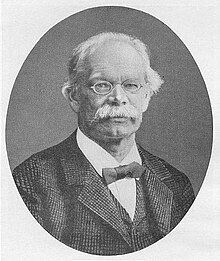Kurt (also: Curt) Wachsmuth (born 27. April 1837 in Naumburg (Saale); died 8. June 1905 in Leipzig) was a German classical scholar and historian.
Life
Kurt Wachsmuth was the son of the Judicial Council Julius Wachsmuth (1803-1877). Educated in Pforta, a former Cistercian monastery dating from 1140, and now a celebrated German public school, he studied from 1856 in Jena and Bonn. During his studies, in 1856, he became a member of the Arminia fraternity in the castle cellar. He went for a half-year stay in Berlin as a teacher at the Joachimsthal Grammar School in the autumn of 1860. As part of an archaeological travel scholarship to Italy, he served in 1861 as Secretaire Interprete at the Prussian embassy in Athens. In 1862 he returned to Bonn for Classics and Ancient History. In 1864 he became a full professor in Marburg, in 1868 in Göttingen and from Easter 1877 in Heidelberg. From 1886, Wachsmuth taught in Leipzig, where he succeeded the philologist Ludwig Lange and took over the chair of Ancient History and Classical Philology. He was also director of the historical as well as philological seminar of the University of Leipzig. Wachsmuth was rector of Marburg from 1868 to 1869 and from 1897 to 1898 he was rector of Leipzig University.
Wachsmuth’s interests were not limited to history or philology.
Apart from his importance as a philologist, Wachsmuth had special significance as an historian with his topography of Greece and in particular of ancient Athens. His description of Athens may be considered a masterpiece of analysis of ancient sources, even if it is left unfinished. It ends at the time of Justinian. The history of the city of Athens in the Middle Ages by Ferdinand Gregorovius continues on from where he left off.
Although many of Wachsmuth’s conclusions have been rendered no longer tenable by recent archaeological studies, he retains the merit of having interrogated the relevant ancient sources, especially for the topography of Athens. He used the contemporary archaeological literature extensively.
In Wachsmuth’s work, Classical Philology and Ancient History were brought together to establish his reputation as a scholar at the ‘crossroads’ of both disciplines.
On Wachsmuth’s instigation of 1866, the creation of the archaeological collection of casts in Marburg came about.
Works
- “De Timone Phliasio ceterisque sillographis Graecis” (Leipsic. 1859)
- “De Cratete Mallota” (the. 1860)
- “The old Greece in the new” (Bonn 1864)
- “The City of Athens in ancient times” (vol. 1, Leipz. 1874, vol. 2, 1890)
- “Studies of the Greek anthologies” (Berl., 1882)
- Editions of “Lydus de ostentis” and the Greek calendars (Leipz. 1863), the Stobaeus (Berl. 1884 vols.) U. Of Sillographorum graecorum reliquiae “(Leipsig. 1885).
From Wikipedia, the free encyclopedia – translated and edited from wikipedia.de


